- Home
- Jr. Horatio Alger
Joe's Luck; Or, Always Wide Awake Page 3
Joe's Luck; Or, Always Wide Awake Read online
Page 3
In the barroom Joe found a file of two of the New York daily papers,and began to search for the advertisement of the California steamers.
At last he found it.
The steamer was to start in three days. Apply for passage and anyinformation at the company's offices.
"I'll go right down there, and find out whether I've got money enoughto take me," Joe decided.
CHAPTER VI
JOE BUYS A TICKET
The office of the steamer was on the wharf from which it was tostart. Already a considerable amount of freight was lying on thewharf ready to be loaded. Joe made his way to the office.
"Well, boy, what's your business?" inquired a stout man with a redface, who seemed to be in charge.
"Is this the office of the California steamer, sir?"
"Yes."
"What is the lowest price for passage?"
"A hundred dollars for the steerage."
When Joe heard this his heart sank within him. It seemed to be thedeath-blow to his hopes. He had but fifty dollars, or thereabouts,and there was no chance whatever of getting the extra fifty.
"Couldn't I pay you fifty dollars now and the rest as soon as I canearn it in California?" he pleaded.
"We don't do business in that way."
"I'd be sure to pay it, sir, if I lived," said Joe. "Perhaps youthink I am not honest."
"I don't know whether you are or not," said the agent cavalierly."We never do business in that way."
Joe left the office not a little disheartened.
"I wish it had been a hundred dollars Aunt Susan left me," he said tohimself.
Joe's spirits were elastic, however. He remembered that Seth hadnever given him reason to suppose that the money he had would pay hispassage by steamer. He had mentioned working his passage in asailing-vessel round the Horn. Joe did not like that idea so well,as the voyage would probably last four months, instead of twenty-fivedays, and so delay his arrival.
The afternoon slipped away almost without Joe's knowledge. He walkedabout, here and there, gazing with curious eyes at the streets, andwarehouses, and passing vehicles, and thinking what a lively placeNew York was, and how different life was in the metropolis from whatit had been to him in the quiet country town which had hitherto beenhis home. Somehow it seemed to wake Joe up, and excite his ambition,to give him a sense of power which he had never felt before.
"If I could only get a foothold here," thought Joe, "I should bewilling to work twice as hard as I did on the farm."
This was what Joe thought. I don't say that he was correct. Thereare many country boys who make a mistake in coming to the city. Theyforsake quiet, comfortable homes, where they have all they need, toenter some city counting-room, or store, at starvation wages, with,at best, a very remote prospect of advancement and increased risk offalling a prey to temptation in some of the many forms which itassumes in a populous town. A boy needs to be strong, andself-reliant, and willing to work if he comes to the city to competefor the prizes of life. As the story proceeds, we shall learnwhether Joe had these necessary qualifications.
When supper was over he went into the public room of the CommercialHotel, and took up a paper to read. There was a paragraph aboutCalifornia, and some recent discoveries there, which he read withavidity.
Though Joe was not aware of it, he was closely observed by adark-complexioned man, dressed in rather a flashy manner. When ourhero laid down the paper this man commenced a conversation.
"I take it you are a stranger in the city, my young friend?" heobserved, in an affable manner.
"Yes, sir," answered Joe, rather glad to have some one to speak to."I only arrived this morning."
"Indeed! May I ask from what part of the country you come?"
"From Oakville, New Jersey."
"Indeed! I know the place. It is quite a charming town."
"I don't know about that," said Joe. "It's pretty quiet anddull--nothing going on."
"So you have come to the city to try your luck?"
"I want to go to California."
"Oh, I see--to the gold-diggings."
"Have you ever been there, sir?"
"No; but I have had many friends go there. When do you expect tostart?"
"Why, that is what puzzles me," Joe replied frankly. "I may not beable to go at all."
"Why not?"
"I haven't got money enough to buy a ticket."
"You have got some money, haven't you?"
"Yes--I have fifty dollars; but I need that a hundred dollars is thelowest price for a ticket."
"Don't be discouraged, my young friend," said the stranger, in themost friendly manner. "I am aware that the ordinary charge for asteerage ticket is one hundred dollars, but exceptions are sometimesmade."
"I don't think they will make one in my case," said Joe. "I told theagent I would agree to pay the other, half as soon as I earned it,but he said he didn't do business in that way."
"Of course. You are a stranger to him, don't you see? That makesall the difference in the world. Now, I happen to be personallyacquainted with him. I am sure he would do me a favor. Just give methe fifty dollars, and I'll warrant I'll get the ticket for you."
Joe was not wholly without caution, and the thought of parting withhis money to a stranger didn't strike him favorably. Not that he hadany doubts as to his new friend's integrity, but it didn't seembusinesslike.
"Can't I go with you to the office?" he suggested.
"I think I can succeed better in the negotiation if I am alone," saidthe stranger. "I'll tell you what--you needn't hand me the money,provided you agree to take the ticket off my hands at fifty dollarsif I secure it."
"Certainly I will, and be very thankful to you."
"I always like to help young men along," said the strangerbenevolently. "I'll see about it to-morrow. Now, where can I meetyou?"
"In this room. How will that do?"
"Perfectly. I am sure I can get the ticket for you. Be sure to havethe money ready."
"I'll be sure," said Joe cheerfully.
"And hark you, my young friend," continued the stranger, "don't say aword to any one of what I am going to do for you, or I might haveother applications, which I should be obliged to refuse."
"Very well, sir. I will remember."
Punctually at four the next day the stranger entered the room, whereJoe was already awaiting him.
"Have you succeeded?" asked Joe eagerly.
The stranger nodded.
"Let us go up to your room and complete our business. For reasonswhich I have already mentioned, I prefer that the transaction shouldbe secret."
"All right, sir."
Joe got his key, and led the way up-stairs.
"I had a little difficulty with the agent," said the stranger; "butfinally he yielded, out of old friendship." He produced a large card,which read thus:
CALIFORNIA STEAMSHIP COMPANY.
THE BEARER
Is Entitled to One Steerage Passage
FROM
NEW YORK TO SAN FRANCISCO
STEAMER COLUMBUS.
Below this was printed the name of the agent. Joe paid over themoney joyfully.
"I am very much obliged to you," he said gratefully.
"Don't mention it," said the stranger, pocketing the fifty dollars."Good day! Sorry to leave you, but I am to meet a gentleman at five."
He went down-stairs, and left Joe alone.
CHAPTER VII
JOE GETS INTO TROUBLE
"How lucky I have been," thought Joe, in the best of spirits. "Therewasn't one chance in ten of my succeeding, and yet I have succeeded.Everything has turned out right. If I hadn't met this man, Icouldn't have got a ticket at half price."
Joe found that after paying his hotel expenses, he should have adollar left over. This would be rather a small sum to start with inCalifornia, but Joe didn't trouble himself much about that.
In the course of the day Joe found himsel
f in the upper part of theBowery. It seemed to him a very lively street, and he was muchinterested in looking in at the shop windows as he passed.
He was standing before a window, when a stone from some quarterstruck the pane and shivered it in pieces.
Joe was startled, and was gazing at the scene of havoc inbewilderment, when a stout German, the proprietor, rushed out andseized him by the collar.
"Aha! I have you, you young rascal!" he exclaimed furiously. "I'llmake you pay for this!"
By this time Joe had recovered his senses.
"Let me alone!" he exclaimed.
"I let you know!" exclaimed the angry man. "You break my window!You pay me five dollar pretty quick, or I send you to prison!"
"I didn't break your window! It's a lie!"
"You tell me I lie?" shouted the angry German. "First you break mywindow, then you tell me I lie! You, one bad boy--you one loafer!"
"I don't know who broke your window," said Joe, "but I tell you Ididn't. I was standing here, looking in, when, all at once, I hearda crash."
"You take me for one fool, perhaps," said his captor, puffing withexcitement. "You want to get away, hey?"
"Yes, I do."
"And get no money for my window?"
By this time a crowd had collected around the chief actors in thisscene. They were divided in opinion.
"Don't he look wicked, the young scamp?" said a thin-visaged femalewith a long neck.
"Yes," said her companion. "He's one of them street rowdies that goaround doin' mischief. They come around and pull my bell, and runaway, the villians!"
"What's the matter, my boy?" asked a tall man with sandy hair,addressing himself to Joe in a friendly tone.
"This man says I broke his window."
"How was it? Did you break it?"
"No, sir. I was standing looking in, when a stone came fromsomewhere and broke it."
"Look here, sir," said the sandy-haired man, addressing himself tothe German, "what reason have you for charging this boy with breakingyour window?"
"He stood shoost in front of it," said the German.
"If he had broken it, he would have run away. Didn't that occur toyou?"
"Some one broke mine window," said the German.
"Of course; but a boy who threw a stone must do so from a distance,and he wouldn't be likely to run up at once to the broken window."
"Of course not. The man's a fool!" were the uncomplimentary remarksof the bystanders, who a minute before had looked upon Joe asundoubtedly guilty.
"You've got no case at all," said Joe's advocate. "Let go the boy'scollar, or I shall advise him to charge you with assault and battery."
"Maybe you one friend of his?" said the German.
"I never saw the boy before in my life," said the other, "but I don'twant him falsely accused."
"Somebody must pay for my window."
"That's fair; but it must be the boy or man that broke it, not myyoung friend here, who had no more to do with it than myself. Isympathize with you, and wish you could catch the scamp that did it."
At that moment a policeman came up.
"What's the matter?" he asked.
"My window was broke--dat's what's de matter."
"Who broke it?" asked the policeman.
"I caught dat boy standing outside," pointing to Joe.
"Aha, you young rascal! I've caught you, have I? I've had my eye onyou for weeks!"
And Joe, to his dismay, found himself collared anew.
"I've only been in the city two days," said Joe.
"Take him to jail!" exclaimed the German.
And the policeman was about to march off poor Joe, when a voice ofauthority stayed him.
"Officer, release that boy!" said the sandy-haired man sternly.
"I'll take you along, too, if you interfere."
"Release that boy!" repeated the other sternly; "and arrest theGerman for assault and battery. I charge him with assaulting thisboy!"
"Who are you?" demanded the officer insolently.
"My name is ------, and I am one of the new police commissioners,"said the sandy-haired man quietly.
Never was there a quicker change from insolence to fawning.
"Oh, I beg your pardon, sir," said the officer, instantly releasingJoe. "I didn't know you."
"Nor your duty, either, it appears," said the commissioner sternly."Without one word of inquiry into the circumstances, you were aboutto arrest this boy. A pretty minister of justice you are!"
"Shall I take this man along, sir?" asked the policeman, quitesubdued.
At this suggestion the bulky Teuton hurried into his shop, tremblingwith alarm. With great difficulty he concealed himself under thecounter.
"You may let him go this time. He has some excuse for his conduct,having suffered loss by the breaking of his window. As for you,officer, unless you are more careful in future, you will not longremain a member of the force."
The crowd disappeared, only Joe and his advocate remaining behind.
"I am grateful to you, sir, for your kindness," said Joe. "But foryou I should have been carried to the station-house."
"It is fortunate I came along just as I did. Are you a stranger inthe city?"
"Yes, sir."
"You must be careful not to run into danger. There are many perilsin the city for the in experienced."
"Thank you, sir. I shall remember your advice."
The next day, about two hours before the time of sailing, Joe wentdown to the wharf.
As he was going on board a man stopped him.
"Have you got a ticket?" he asked.
"Yes, sir," said Joe, "a steerage ticket. There it is."
"Where did you get this?" asked the man.
Joe told him.
"How much did you pay for it?"
"Fifty dollars."
"Then you have lost your money, for it is a bogus ticket. You can'ttravel on it."
Joe stared at the other in blank dismay. The earth seemed to besinking under him. He realized that he had been outrageouslyswindled, and that he was farther from going to California than ever.
CHAPTER VIII
JOE'S LUCK CHANGES
The intelligence that his ticket was valueless came to Joe like athunderbolt from a clear sky. The minute before he was in highspirits--his prospects seemed excellent and his path bright.
"What shall I do?" he ejaculated.
"I can't tell you," said the officer. "One thing is clear--you can'tgo to California on that ticket."
Poor Joe! For the moment hope was dead within his breast. He hadbut one dollar left and that was only half the amount necessary tocarry him back to the village where we found him at the commencementof our story. Even if he were able to go back, he felt he would beashamed to report the loss of his money. The fact that he hadallowed himself to be swindled mortified him not a little. He wouldnever hear the last of it if he returned to Oakville.
"No; I wouldn't go back if I could," he decided.
"Wouldn't I like to get hold of the man that sold me the ticket!"
He had hardly given mental expression to this wish when it wasgratified. The very man passed him and was about to cross thegangplank into the steamer. Joe's eyes flashed, and he sprangforward and seized the man by the arm.
The swindler's countenance changed when he recognized Joe, but hequickly decided upon his course.
"What do you want, Johnny?" he asked composedly.
"What do I want? I want my fifty dollars back."
"I don't know what you are talking about."
"You sold me a bogus ticket for fifty dollars," said Joe stoutly."Here it is. Take it back and give me my money."
"The boy must be crazy," said the swindler.
"Did you sell him that ticket?" inquired the officer.
"Never saw him before in my life."
"Ain't you mistaken, boy?" asked the officer.
"No, sir. This is the very man."
&nbs
p; "Have you any business here?" asked the officer.
"Yes," said the man; "I've taken a steerage ticket to San Francisco.Here it is."
"All right. Go in."
He tore himself from Joe's grasp and went on board the steamer. Ourhero, provoked, was about to follow him, when the officer said:
"Stand back! You have no ticket."
"That man bought his ticket with my money."
"That is nothing to me," said the officer. "It may be so, or you maybe mistaken."
"I am not mistaken," said Joe.
"You can report it to the police--that is, if you think you can proveit. Now, stand back!"
Poor Joe! He had been worsted in the encounter with thisarch-swindler. He would sail for San Francisco on the Columbus.Perhaps he would make his fortune there, while Joe, whom he had soswindled, might, within three days, be reduced to beggary.
Joe felt that his confidence in human nature was badly shaken.Injustice and fraud seemed to have the best of it in this world, sofar as his experience went, and it really seemed as if dishonestywere the best policy. It is a hard awakening for a trusting boy,when he first comes in contact with selfishness and corruption.
Joe fell back because he was obliged to. He looked around, hopingthat he might somewhere see a policeman, for he wanted to punish thescoundrel to whom he owed his unhappiness and loss. But, asfrequently happens, when an officer is wanted none is to be seen.

 Adrift in New York: Tom and Florence Braving the World
Adrift in New York: Tom and Florence Braving the World Do and Dare — a Brave Boy's Fight for Fortune
Do and Dare — a Brave Boy's Fight for Fortune The Cash Boy
The Cash Boy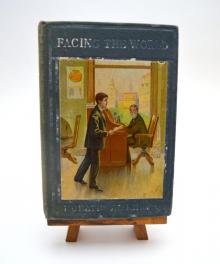 Facing the World
Facing the World The Young Explorer; Or, Claiming His Fortune
The Young Explorer; Or, Claiming His Fortune The Store Boy
The Store Boy Frank's Campaign; Or, The Farm and the Camp
Frank's Campaign; Or, The Farm and the Camp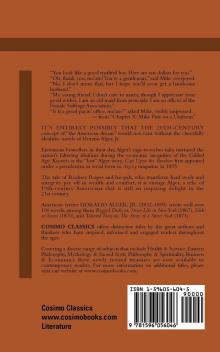 Cast Upon the Breakers
Cast Upon the Breakers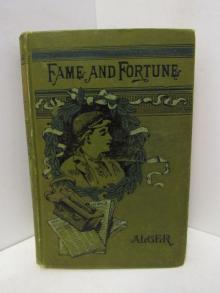 Fame and Fortune; or, The Progress of Richard Hunter
Fame and Fortune; or, The Progress of Richard Hunter The Errand Boy; Or, How Phil Brent Won Success
The Errand Boy; Or, How Phil Brent Won Success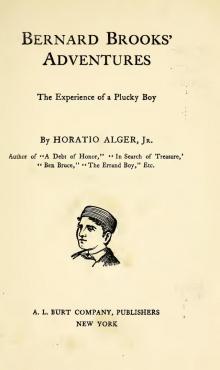 Bernard Brooks' Adventures: The Experience of a Plucky Boy
Bernard Brooks' Adventures: The Experience of a Plucky Boy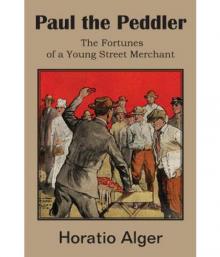 Paul the Peddler; Or, The Fortunes of a Young Street Merchant
Paul the Peddler; Or, The Fortunes of a Young Street Merchant Brave and Bold; Or, The Fortunes of Robert Rushton
Brave and Bold; Or, The Fortunes of Robert Rushton Try and Trust; Or, Abner Holden's Bound Boy
Try and Trust; Or, Abner Holden's Bound Boy Phil, the Fiddler
Phil, the Fiddler In A New World; or, Among The Gold Fields Of Australia
In A New World; or, Among The Gold Fields Of Australia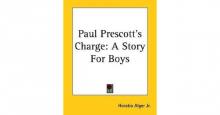 Paul Prescott's Charge
Paul Prescott's Charge Joe's Luck; Or, Always Wide Awake
Joe's Luck; Or, Always Wide Awake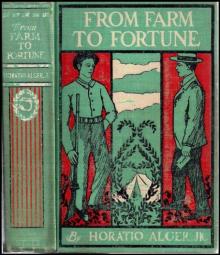 From Farm to Fortune; or, Nat Nason's Strange Experience
From Farm to Fortune; or, Nat Nason's Strange Experience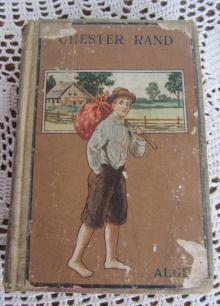 Chester Rand; or, The New Path to Fortune
Chester Rand; or, The New Path to Fortune Driven from Home; Or, Carl Crawford's Experience
Driven from Home; Or, Carl Crawford's Experience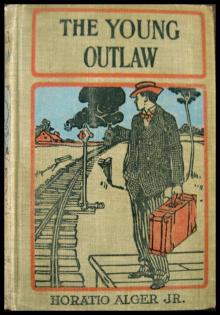 The Young Outlaw; or, Adrift in the Streets
The Young Outlaw; or, Adrift in the Streets Risen from the Ranks; Or, Harry Walton's Success
Risen from the Ranks; Or, Harry Walton's Success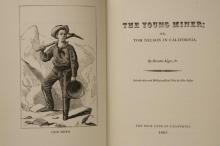 The Young Miner; Or, Tom Nelson in California
The Young Miner; Or, Tom Nelson in California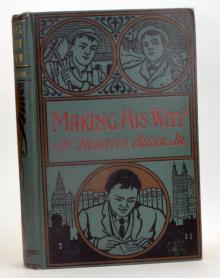 Making His Way; Or, Frank Courtney's Struggle Upward
Making His Way; Or, Frank Courtney's Struggle Upward Ben, the Luggage Boy; Or, Among the Wharves
Ben, the Luggage Boy; Or, Among the Wharves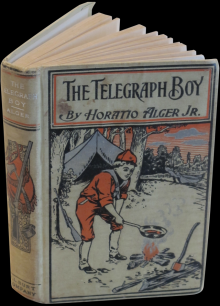 The Telegraph Boy
The Telegraph Boy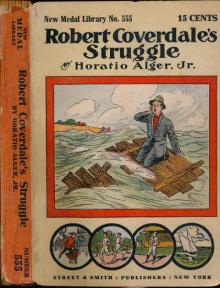 Robert Coverdale's Struggle; Or, on the Wave of Success
Robert Coverdale's Struggle; Or, on the Wave of Success Rufus and Rose; Or, The Fortunes of Rough and Ready
Rufus and Rose; Or, The Fortunes of Rough and Ready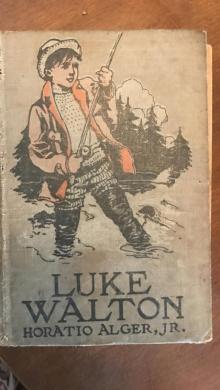 Luke Walton
Luke Walton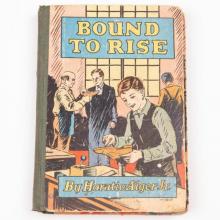 Mark Mason's Victory: The Trials and Triumphs of a Telegraph Boy
Mark Mason's Victory: The Trials and Triumphs of a Telegraph Boy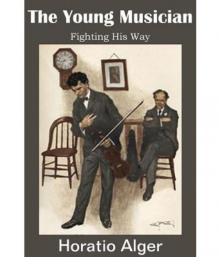 The Young Musician; Or, Fighting His Way
The Young Musician; Or, Fighting His Way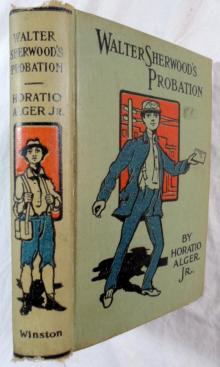 Walter Sherwood's Probation
Walter Sherwood's Probation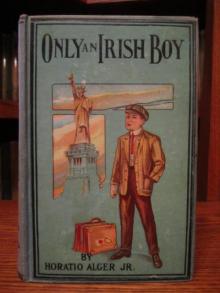 Only an Irish Boy; Or, Andy Burke's Fortunes
Only an Irish Boy; Or, Andy Burke's Fortunes Slow and Sure: The Story of Paul Hoffman the Young Street-Merchant
Slow and Sure: The Story of Paul Hoffman the Young Street-Merchant Herbert Carter's Legacy; Or, the Inventor's Son
Herbert Carter's Legacy; Or, the Inventor's Son Young Captain Jack; Or, The Son of a Soldier
Young Captain Jack; Or, The Son of a Soldier Timothy Crump's Ward: A Story of American Life
Timothy Crump's Ward: A Story of American Life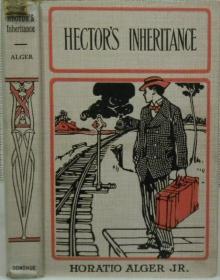 Hector's Inheritance, Or, the Boys of Smith Institute
Hector's Inheritance, Or, the Boys of Smith Institute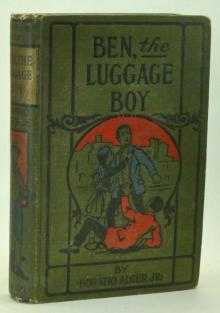 Ben's Nugget; Or, A Boy's Search For Fortune
Ben's Nugget; Or, A Boy's Search For Fortune